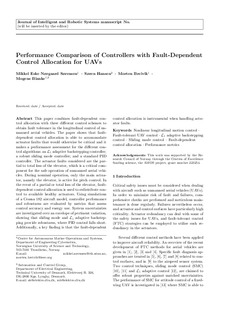Performance Comparison of Controllers with Fault-Dependent Control Allocation for UAVs
Journal article, Peer reviewed
Permanent lenke
http://hdl.handle.net/11250/2442836Utgivelsesdato
2017Metadata
Vis full innførselSamlinger
Originalversjon
10.1007/s10846-017-0494-9Sammendrag
This paper combines fault-dependent control allocation with three different control schemes to obtain fault tolerance in the longitudinal control of unmanned aerial vehicles. The paper shows that fault-dependent control allocation is able to accommodate actuator faults that would otherwise be critical and it makes a performance assessment for the different control algorithms: an L_1 adaptive backstepping controller; a robust sliding mode controller; and a standard PID controller. The actuator faults considered are the partial to total loss of the elevator, which is a critical component for the safe operation of unmanned aerial vehicles. During nominal operation, only the main actuator, namely the elevator, is active for pitch control. In the event of a partial or total loss of the elevator, fault-dependent control allocation is used to redistribute control to available healthy actuators. Using simulations of a Cessna 182 aircraft model, controller performance and robustness are evaluated by metrics that assess control accuracy and energy use. System uncertainties are investigated over an envelope of pertinent variation, showing that sliding mode and L_1 adaptive backstepping provide robustness, where PID control falls short. Additionally, a key finding is that the fault-dependent control allocation is instrumental when handling actuator faults.
